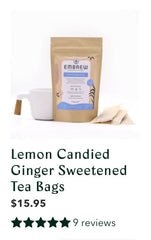Sip on Ginger Tea’s Sweet Benefits
From Reducing Nausea to Relieving Stress

Ginger tea is one that I should absolutely drink more of for a ton of reasons—from relieving stress when I’m worried about something to easing cramps during that time of the month.
But did you also know that there are many different types of ginger used in teas? When I first started sourcing it for the Lemon Candied Ginger tea blend, I was very surprised about the variety of flavors available. Some are spicier than others, some are more medicinal, and some are even more floral. While not all ginger tastes the same, they’re all made from the same root. Plants are so awesome!
The History of Ginger

For thousands of years, ginger has been used to remedy cold symptoms, nausea, arthritis, and headaches—and if it ain’t broke, don’t fix it. In fact, according to Ann M. Bode and Zigang Dong’s book Herbal Medicine: Biomolecular and Clinical Aspects. 2nd edition, people in India and China are rumored to have produced ginger as a tonic for over 5000 years to treat illnesses. It was also used as a high value trade item, being exported from India to the Roman Empire over 2000 years ago. After this, ginger became increasingly popular in Europe while Arab merchants controlled the commodity for centuries. By the medieval era, ginger was being used in sweets—Queen Elizabeth I is even believed to have been the creator of the gingerbread man.
Today, ginger is grown in humid parts of the world, and India is the largest producer. Interestingly, it’s a member of a plant family that’s home to cardamom and turmeric, too. Its spice and aroma comes from ketones and gingerols found in the main part of the plant, the rhizome, which is the most consumed part of the plant. You can usually find ginger in a variety of forms including fresh, dried, pickled, preserved, candied, and powdered—and yes, especially in tea.
Is Ginger Tea Good For You?
The short answer is yes! Now, I can only speak from personal experience, customer feedback, and the research I have done, but ginger tea benefits are definitely worth exploring. Especially if you suffer from stomach pain, stress, menstrual discomfort, or inflammation. According to Healthline, and corroborated by medical journals like “Ginger on Human Health: A Comprehensive Systematic Review,” here are several ailments ginger may help with*:
- Boosting immunity
- Relieving stress
- Improving gut health
- Reducing inflammation
- Combatting respiratory issues
- Enhancing blood circulation
- Improving menstrual discomfort
- Relieving nausea
How Our Customers Use Ginger Tea

|
 |
Over the last several years, I have had a few customers tell me that they lived on our Lemon Candied Ginger tea when they were in their first trimester of pregnancy. Another customer told me that their husband makes a hot toddy with ginger tea and bourbon in the evenings to relax. From personal experience, my husband makes a warm cocktail concoction using bourbon that tastes like Theraflu, which he loves the taste of...weird, lol. I encourage you to try any of these tactics to aid in stress relief or nausea—you never know what might work for you!
A lot of people also ask me about the best time to drink ginger tea. While it’s great to enjoy any time of day, I typically recommend drinking it in the morning within the first half hour of waking up because it may help kickstart your metabolism and prevent any gut issues throughout the day.
Discover Ginger Tea Types

If you want to reap ginger tea benefits while spicing up your daily tea routine, check out a variety of blends that are available on the market.
Fresh Ginger Tea
If you have some time and want really great quality ginger tea, you can actually make it from scratch! Sencha Tea Bar recommends taking the ginger root and using a knife to cut three to four thin slices. Then, add the slices to a cup of hot water and steam for a few minutes. If you are one of those that likes the ginger to really punch you, use a zester or grater on the root. I like to add a touch of honey to cut the acidity a bit.
Lemon Ginger Tea
Maybe I’m biased, but lemon ginger tea is a staple for me. The lemon balances the ginger so nicely, and it adds some Vitamin C to your cup along with alkalinity to your body once it’s digested (weird right?). Our Lemon Candied Ginger blend is an herbal tea that combines a kick of ginger with lemon-infused organic cane sugar, making it perfectly pre-sweetened for anytime of day.
Ginger Green Tea
This type is technically considered a flavored green tea, and is brewed by mixing the leaves with ginger root. The grassy and vegetal notes of green tea pair well with the sharpness of the ginger spice, and because of the tea leaves, this blend usually has a little bit of caffeine as well.
Turmeric Ginger Tea
Level up your ginger tea with a touch of turmeric, another delectable Indian spice and with strong anti-inflammatory properties. It has a spicy, woody aroma that plays well with ginger and it’s often associated with boosting energy. Be careful though, it can be bitter, so use it sparingly. This is another one that I love to add a small amount of raw honey to help balance it out.
Chai Tea
Did you know that one of the five spices in masala chai is ginger? It’s mixed with black pepper, cloves, cinnamon, and cardamom to make one robust cup. You can snag a couple simple chai tea recipes on our blog!



